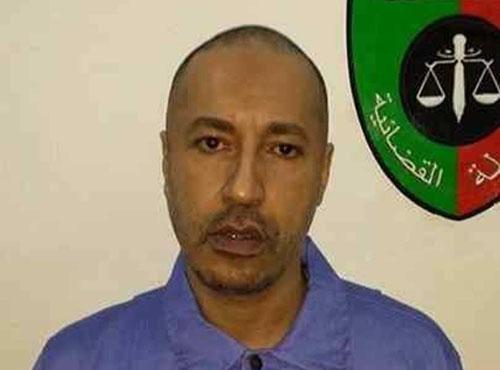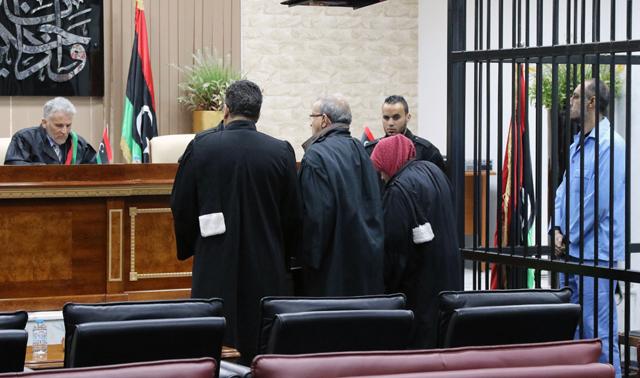You are here
Niger extradites Qadhafi’s son Saadi to Libya
By Reuters - Mar 06,2014 - Last updated at Mar 06,2014

TRIPOLI — Muammar Qadhafi’s son Saadi, his special forces commander who fled abroad during Libya’s 2011 revolution, was imprisoned in Tripoli on Thursday after Niger agreed to send him back from house arrest there.
Saadi, who had a brief career as football player in Italy and often lived the playboy life during his father’s rule, is the first of Qadhafi’s sons the central government has managed to arrest since the former dictator was overthrown.
Qadhafi’s more prominent son Saif Al Islam, long viewed as his heir, has been held captive by fighters in western Libya who refuse to hand him over to a government they deem too weak to secure and try him.
Eager to close another chapter from the four-decade Qadhafi rule, Tripoli had long been seeking the extradition of Saadi, who had fled to the southern neighbour by slipping over the porous sub-Saharan border after the uprising.
“The Libyan government received today Saadi Qadhafi and he arrived in Tripoli,” Prime Minister Ali Zeidan’s Cabinet said in a statement that thanked Niger’s government for its help.
The extradition is a success for Zeidan, but also a test whether his weak government is able to hold such a high-profile prisoner and organise a fair trial in the political chaos that has followed the uprising.
The government said Saadi, 40, would be treated according to international law.
Since escaping Libya in 2011, he had been held under house arrest in the Niger capital Niamey. Libyan authorities believe he was active from there in fomenting unrest in southern Libyan.
Within an hour of the news of his arrival, a militia on the Libyan state payroll published photographs of an uncomfortable looking Saadi in a blue prison jumpsuit, kneeling while a guard shaved his beard and head with an electric razor.
“The first pictures of the criminal,” the Libyan Revolutionary Operations Room militia said on its website, showing pictures of Saadi before and after the shave.
State prosecutors are investigating Saadi for crimes in suppressing the eight-month uprising against his father, state news agency LANA said.
Tripoli also wants to try him for allegedly misappropriating property by force and for alleged armed intimidation when he headed the Libyan Football Federation.
Arrest might calm south
There was no immediate official comment from Niger, which Libyan analysts said had agreed to cooperate because both must worth together to try to secure their long border against weapons smugglers, militant Islamists and human traffickers.
Niger sources said Saadi was spirited into Libya on board a Libyan plane overnight, accompanied by Libyan security agents.
Political analyst Khalid Al Tarjaman said Libya had convinced Niger that Saadi’s presence was giving a boost to Qadhafi loyalists in Libya’s volatile south whom Tripoli has accused of provoking clashes in the main city Sabha in January.
“The government in Niger realised that Saadi’s presence was the main source for tensions in Libya’s south, which is also affecting Niger’s sovereignty,” he said.
Saadi, who also had a business career before 2011 thanks to the quasi-monopoly his family enjoyed in many sectors of the economy, is not wanted by the International Criminal Court.
The ICC has indicted Saif Al Islam for crimes against humanity. He is being held by militia fighters in Zintan and tried there for various charges, although a local court keeps adjourning proceedings after brief sessions.
Zintan fighters have allies themselves to tribes that once formed Qadhafi’s power base, which analysts say partly explains their benevolent attitude towards Saif Al Islam.
Tarjaman said Saadi’s expulsion from Niger might help Libya persuade other countries such as Egypt or Tunisia to extradite Qadhafi relatives and former top officials.
Several family members such as Qadhafi’s daughter Aisha and her brother Hannibal had fled to Algeria during the uprising. They moved to Oman after Aisha had irritated Algerian authorities by discussing politics in public.
Related Articles
Slain dictator Muammar Qadhafi’s son Saadi has asked Libyans for forgiveness in an interview released by prison authorities three weeks after his extradition from neighbouring Niger.
TRIPOLI — Saadi Qadhafi, a son of Libya’s late dictator Muammar Qadhafi who was overthrown and killed in a 2011 uprising, has been freed fro
TRIPOLI — Libyan state prosecutors are investigating unidentified guards purportedly shown in a video beating a son of Muammar Qadhafi held












